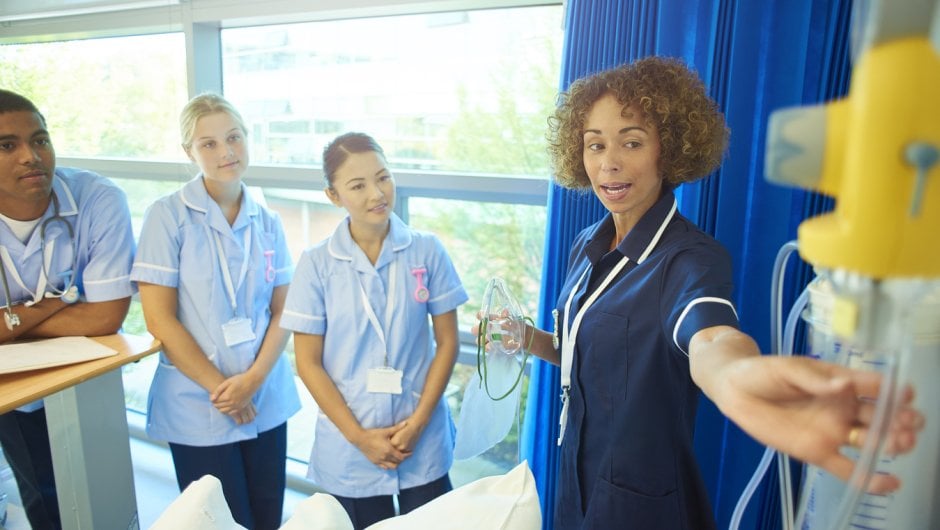Nurses provide compassionate care to people from birth to end of life, working across diverse healthcare settings including NHS organisations, social care, community organisations, independent healthcare, charities, military services, educational institutions, public health, prison service and research facilities.
Modern nursing combines advanced clinical science with cutting-edge technology and deeply personal care. Nurses work as part of multidisciplinary teams, delivering hands-on treatment, coordinating complex care plans, educating patients and families, and advocating for those in their care. From life-saving interventions to bringing comfort and dignity in difficult times, nursing encompasses many different specialisms united under one profession.
You will receive at least a £5,000 bursary to study nursing. Whether you've qualified in adult, children's, mental health or learning disability nursing, your expertise is needed across many different specialisms united under one profession. Nursing careers offer endless opportunities - no two nursing careers follow the same path.
The impact you could make
- Make a difference to people’s lives through care, attention to detail and innovation.
- Become a leader, dedicated to clinical advancement, research, effective treatment plans, and positive outcomes for patients.
- Specialise in areas like learning disabilities, neonatal care or trauma.
What you could study
- Introduction to clinical care: mental and physical
- Anatomy and physiology
- Assessment and therapeutic practice
- Epidemiology
- Complex and chronic condition management
- Health prevention and promotion
- Planning patient care
- Pharmacology and medicines management
- Ethics and legislation
Study options and Subject Spotlights
Options to study in this field include:

Discover careers in the NHS
The NHS offers a variety of careers in the nursing sector. Discover roles in the NHS and the different ways to get started on your future career.
Find out more
Example module
Work placement
Subjects it's useful to have studied first
Some nursing courses or apprenticeships will have requirements for previous qualifications in certain subjects. Each university sets its own entry requirements, but in general you’ll need at least five 9-4 (A-C) grade GCSEs (including English, maths and a science subject) and at least two (most prefer three) A levels. Most universities require A level biology.
Some universities also accept level 3 qualifications, but you will need to check this with your chosen university before making an application.
Biology (prerequisite subject)
Psychology
Sociology

The NHS Learning Support Fund
Every eligible* student nurse will receive at least £5,000 grant per year, and up to £8,000 for specialist subjects (e.g. for students studying mental health, or learning disability nursing courses), and for parental support.
*Eligibility criteria is payable to students ordinarily resident in the UK and studying at a university in England.
Hard skills you'll develop
- Clinical practices and governance
- Primary care
- Surgery
- Auditing
- Risk analysis
Soft skills you'll develop
- Communications
- Leadership
- Teaching/mentorship
- Planning
- Teamwork
Careers: Where it can take you
Find out more about your career prospects from studying nursing. The following information is based on a typical nurse role.
Average salary
Available jobs
Career options
Adult nurses can specialise in areas such as surgical nursing, diabetes care, or genomics
Children’s nurses may work in acute paediatric care or support children and young people with autism.
Mental health nurses may work in forensic care, early intervention psychosis teams, or assertive outreach.
Learning disability nurses can specialise in supporting people with epilepsy, acquired brain injury, or profound and multiple learning disabilities.

What is a… travel nurse?
You may not have heard of a travel nurse, but if you're interested in a career in nursing and you don’t want to be stuck in one place then this role might appeal to you. Travel nurses are qualified nurses, usually with a few years’ experience, who then work on short-term contracts moving around the UK or abroad. Many choose to fill nursing vacancies at short notice in developing countries, and can make a big difference to people’s lives. It can also be a great way to further build up your CV and get a wide variety of experiences in a relatively short space of time.

Find your ideal career
Take our careers quiz to find your ideal job matched to your personality type.Getting in: Entry requirements
Find out more about what you'll need to study nursing at university or as an apprenticeship.
Average requirements for undergraduate degrees
Entry requirements differ between university and course, but this should give you a guide to what is usually expected from nursing applicants.
A levels
Scottish Highers
Vocational

Health and science apprenticeships
Check out our industry guide to help you decide if a health and science apprenticeship might be the right choice for you.Nursing is incredible and provides you with a diverse and rewarding career across health and social care. Nurses don’t just work in hospitals. There are opportunities to work in GP surgeries, clinics, education, research, health informatics, nursing and residential homes as well as occupational health services, voluntary organisations, industry, and the military. Every day will be different, and you will continue to learn and develop throughout your career."
Learning new skills and being able to put them into practice, and being able to adapt to surroundings, building rapport relationships with MDT patients and families. I also enjoy being able to learn new techniques and leadership skills.
Considering an apprenticeship?
Applying for an apprenticeship is just like applying for a normal job. Here’s what you need to know:-
1
Deadline
Apprenticeships don't follow the same deadlines as applying to uni, the deadline is down to the employer. -
2
Where to apply
You apply directly through the employer. -
3
No limits
You're not restricted to one apprenticeship application; you can do as many as you like. -
4
Apply to university and apprenticeships
There's nothing stopping you applying to university through UCAS, while also applying for apprenticeship vacancies. -
5
Find out more
Listen to our podcast about nursing apprenticeships.
Let's talk about... nursing apprenticeships
Not sure if a traditional degree is for you? Listen to our new podcast to learn more about studying degree apprenticeships in nursing.

Apprenticeship vacancies
Check out live apprenticeship vacancies in health and science.Explore further
Go deeper into topics around nursing with the following.
-
1
The King’s Fund
Independent charitable organisation that features videos and written content explaining how the NHS works and what is changing. A great way of keeping informed about one of the world’s (and nurses’) largest employers. -
2
Nurse Zara
-
3
Nurses on the ward
A UK TV play documentary following nurses on a real-life hospital ward in Plymouth, showing the challenges, dramas, and rewards of this career.
Life as a nurse
Case study video
Application advice
Whether it's personal statement tips or what to write in a cover letter for an apprenticeship application, our application advice will help you get ahead in your nursing journey.Skills, experiences, and interests to mention
- How can you show you’re caring and compassionate? Have you looked after a relative or neighbour, or become an advocate for someone locally? Maybe you’ve done some voluntary work or work experience that involved looking out for others, or been a mentor to someone younger?
- What work experience or shadowing have you done at a hospital, GP practice or care home, and what did you learn about the challenges and realities of a caring profession?
- How can you demonstrate that you work well under pressure, and have good time management? Maybe you’ve excelled in exams or other tests? Have you had a busy or demanding part-time job?
- When have you been a good leader? Did you lead a group during a school residential, Scouts or a Duke of Edinburgh expedition? How did you motivate others and how did you cope if things went wrong?









